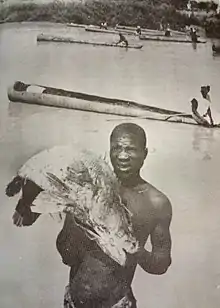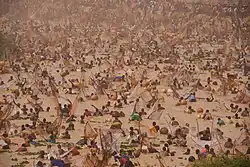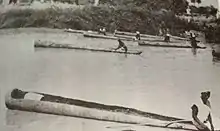Argungu Fishing Festival
The Argungu Fishing Festival[1] or Argungu Dance Festival is an annual four-day festival in Kebbi State and other northern states like Niger in the north-western part of Northern Nigeria.[2] The region is made up of fertile river areas of (matanfada, mala with much irrigation and orchards (lambu in Hausa). The majority of inhabitants are fishermen who are practitioners of Isla religion. They also have Kanta Museum. The Museum is the main historical centre in Argungu for visitors across the globe. People from around the world travel to Argungu just to witness the occasion. The main purpose of the Argungu fishing festival is for fishing and unity. The festival is usually a 4-days cultural event[3]

History

The festival began in the year 1934, as a mark of the end of the centuries-old hostility between the Sokoto Caliphate and the Kebbi Kingdom. This festival has brought huge progress to the development of the state as a whole.[4]
It is usually called a Fishing-Frenzy Festival. The festival is celebrated to mark the beginning of the fishing season in Argungu, a river-side town in Kebbi State. It is celebrated between February and March every year.[5]
In 2005, the winning fish weighed 75kg, and needed four men to hoist it onto the scales.[6] In 2006 the festival banned fishing due to safety concerns relating to the low water levels.[7] The importance of the festival to the economy has led the government to conserve fish stock by prohibiting the use of gill nets and cast nets.[8] The Zauro polder project, an irrigation scheme in the Rima River floodplain to the south of Argungu, has been criticized because the reservoir threatens to flood the traditional site of the festival.[9]
Activities include:
Competition
On the final day of the festival, a competition is held in which thousands of men line up along the river and at the sound of a gunshot, all of them jump into the river and have an hour to catch the largest fish. The winner can take home as much as $7,500 US dollars. Competitors are only allowed to use traditional fishing tools and many prefer to catch fish entirely by hand (a practice also popular elsewhere and known as "noodling") to demonstrate their prowess.
Purpose. The festival has many purposes which include: fishing, promoting unity, fun, and entertainment.[13]
2020 Argungu Fishing Festival

In the 2020 Argungu Fishing Festival, the individual who caught the biggest fish weighing about 78 kilograms was awarded N10 million, two new cars and two Hajj seats, second position, and third positions were also awarded.[14] Over 50,000 fishermen participated in the annual festival held in Kebbi State and the winners were graded based on the weight of the fish caught.[15] The President of Nigeria, Muhammadu Buhari visited the 2020 Argungu Fishing Festival[16][17][18] The festival in 2020 was the 60th edition after 10 years of being on hold according to the governor of the state Abubakar Bagudu.[19][20]
See also
References
- Shyllon, Folarin (August 2007). "Argungu Fishing Festival in Northwestern Nigeria: Promoting the Idea of a Sustainable Cultural Fest". International Journal of Cultural Property. 14 (3): 329–337. doi:10.1017/S094073910707021X. ISSN 1465-7317. S2CID 162837565.
- Okafor, Chiamaka (2022-12-17). "SPECIAL REPORT: How Kebbi farmers are fighting climate change". Premium Times Nigeria. Retrieved 2022-12-25.
- "Argungu Festival: Africa's Biggest Fishing Celebration". Google Arts & Culture. Retrieved 2021-07-31.
- "Argungu Fishing Festival: 5 Things You Should Know". Hotels.ng Guides. 2017-08-30. Retrieved 2021-07-31.
- "Showcasing The Arugungu fishing festival at Northern Nigeria - Courtesy The Scout Association of Nigeria | World Scouting". sdgs.scout.org. Retrieved 2021-07-31.
- Jeremiah (2018-02-11). "Argungu Fishing Festival To Hold A Decade After". Leadership News - Nigeria News, Breaking News, Politics and more. Retrieved 2021-08-24.
- "Nigeria fish festival bans fish". BBC News. 2006-11-07. Archived from the original on March 25, 2008. Retrieved 2008-02-11.
- A.A. Eyo and Y. B. Ahmed. "Management of Inland Capture Fisheries and Challenges to Fish Production in Nigeria" (PDF). Federal College of Freshwater Fisheries Technology. Retrieved 2010-10-09.
- Tosin Omoniyi (20 December 2009). "A Dam of Controversy". Newswatch. Retrieved 2010-10-09.
- "What you need to know about Argungu international fishing festival | The Nation Newspaper". 2020-03-08. Retrieved 2022-12-25.
- "Argungu Fishing Festival: 5 Things You Should Know". Hotels.ng Guides. 2017-08-30. Retrieved 2021-07-31.
- "Argungu fishing festival, breeding ground for future Olympians". The Guardian Nigeria News - Nigeria and World News. 2020-03-14. Retrieved 2022-12-25.
- "Showcasing The Arugungu fishing festival at Northern Nigeria - Courtesy The Scout Association of Nigeria | World Scouting". sdgs.scout.org. Retrieved 2023-09-15.
- "Argungu Fishing Festival: Man with biggest catch gets N10m, two cars, Hajj seats". 2020-03-14. Retrieved 2021-07-31.
- "Argungu Fishing Festival: man with biggest catch gets N10m, 2 cars, Hajj seats". Vanguard News. 2020-03-14. Retrieved 2021-07-31.
- "Buhari Visits Kebbi For Argungu Fishing Festival". Channels Television. Retrieved 2021-07-31.
- "Argungu Festival: We must harness our resources to make Nigeria safe – Lawan". Vanguard News. 2020-03-14. Retrieved 2021-08-24.
- "Return of Argungu festival proof of enhancedeSecurity – Buhari". Vanguard News. 2020-03-12. Retrieved 2021-08-24.
- "Argungu fishing festival, breeding ground for future Olympians". The Guardian Nigeria News - Nigeria and World News. 2020-03-14. Retrieved 2021-08-24.
- "Argungu fishing festival in troubled waters for 10 years". Daily Trust. Retrieved 2021-08-24.
